|
|
|
Sort Order |
|
|
|
Items / Page
|
|
|
|
|
|
|
| Srl | Item |
| 1 |
ID:
138833
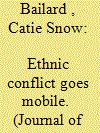

|
|
|
|
|
| Summary/Abstract |
This analysis contributes to the body of research testing the effect of mobile phone availability on the probability of violent conflict by shifting the unit of analysis to that of distinct ethnic groups. This approach provides two important advantages. First, it tests the robustness of this relationship by determining whether this effect maintains when shifted to a more rigorous and theoretically appropriate level of analysis. Second, shifting the analysis to the group level also enables tests of specific characteristics that may condition the effect of mobile phone availability on violent collective action. The first set of characteristics test whether mobile phone availability primarily increases a group’s opportunities to engage in violent collective action as a result of decreased organizational costs due to diminished communication costs. The second set of characteristics explore whether mobile phone availability makes violent collective action more likely as a result of increasing a group’s motivation to organize, thanks to enabling more efficient communication about shared grievances between group members. The results yield mixed support for both of these potential mechanisms, providing needed insight into the dynamics at play in this relationship – a matter that very much remains in the ‘black box’ at this point in time.
|
|
|
|
|
|
|
|
|
|
|
|
|
|
|
|
| 2 |
ID:
101518
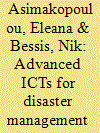

|
|
|
|
|
| Publication |
Hershey, Information Science Reference, 2010.
|
| Description |
xxiv, 344p.
|
| Standard Number |
9781615209873, hbk
|
|
|
|
|
|
|
|
|
|
|
|
Copies: C:1/I:0,R:0,Q:0
Circulation
| Accession# | Call# | Current Location | Status | Policy | Location |
| 055585 | 384.5/ASI 055585 | Main | On Shelf | General | |
|
|
|
|
| 3 |
ID:
182915
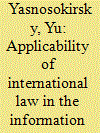

|
|
|
|
|
| Summary/Abstract |
THE ISSUE of the applicability of international law in the field of information and communication technologies (ICT) security is being actively discussed at relevant UN platforms on international information security (IIS): the Open-Ended Working Group (OEWG) on developments in the field of information and telecommunications in the context of international security, and the Group of Governmental Experts (GGE) on Advancing responsible State behavior in cyberspace in the context of international security. This issue has become a kind of "watershed" in key nations' positions in this area. Despite lengthy, years-long deliberations, the international community is still far from not only a consensus but even a common understanding of the basic categories of the applicability of international law to ICT. In order to clarify the issue, it is important to understand the substantive content of this phenomenon, its procedural aspects, and stages of implementation...
|
|
|
|
|
|
|
|
|
|
|
|
|
|
|
|
| 4 |
ID:
140363
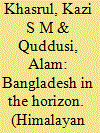

|
|
|
| 5 |
ID:
141952
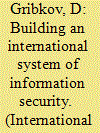

|
|
|
|
|
| Summary/Abstract |
INFORMATION SECURITY is one of the top issues on today's global agenda. Awareness of growing threats in information space and of their potential effects prompts the need for a systemic search for solutions to information security problems.
|
|
|
|
|
|
|
|
|
|
|
|
|
|
|
|
| 6 |
ID:
174637


|
|
|
|
|
| Summary/Abstract |
Rapoport's conceptualization of the last, religious wave of four global waves remains highly influential. But it, and other typologies, have placed too little emphasis on the influence of information and communication technologies (ICTs) on the evolution of global jihadist activities. This article makes two new contributions by developing both a new ICT-based typology for understanding jihadist evolutions, and by focusing on successful attacks. Our central argument is that ICTs’ impact on global jihadism has facilitated dramatic transformations of its strategy, organization and tactics since the 1990s, and that these can be understood as four overlapping iterations. ‘Jihadism 1.0’ describes the hierarchical, top-down directed and overseas financed and trained terrorist organizations that conducted iconic attacks at the turn of the millennium. Jihadism has since evolved into ‘Jihadism 2.0’ and then ‘Jihadism 3.0’. Jihadism 2.0 recognizes that a number of smaller, coordinated attacks can have a global impact. Jihadism 3.0 is inspired terrorism that has no links to the central terror organization, utilizing individuals and crude tactics. Finally, jihadism is evolving toward ‘Jihadism 4.0’, or cyberterrorism. We argue this typology provides a useful basis for scholars and practitioners to conceptualize the ICT dynamics influencing global jihadism, and these may be applicable to other global terrorists. The conclusion analyses how counter-terrorism services can respond to these evolutions and charts areas for future research.
|
|
|
|
|
|
|
|
|
|
|
|
|
|
|
|
| 7 |
ID:
142454
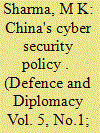

|
|
|
| 8 |
ID:
138832
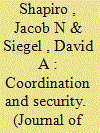

|
|
|
|
|
| Summary/Abstract |
Recent work has shown that the introduction of mobile communications can substantially alter the course of conflict. In Afghanistan and India targeting mobile communications is a central part of the insurgent campaigns. The opposite was true in Iraq. There insurgents instead threatened providers who did not do enough to maintain mobile phone networks. These differences likely arise from two competing effects of mobile communications: they make it easier for antigovernment actors to coordinate collective action, thereby increasing violence, and for pro-government civilians to collaborate with security forces allowing them to more effectively suppress rebels, thereby decreasing violence. To study these competing effects we analyze a formal model of insurgent action in which changes in the communications environment alter both (i) the ability of rebels to impose costs on civilians who cooperate with the government and (ii) the information flow to government forces seeking to suppress rebellion with military action. Our analysis highlights the importance of the threat of information sharing by non-combatants in reducing violence and offers some guidelines for policymakers in thinking about how much to support ICT development in conflict zones. In particular, we show that officials can generate reasonable expectations about whether expanding ICT access will exacerbate conflict or reduce it by assessing the relative gains to both sides from changes in ICT access along several simple dimensions.
|
|
|
|
|
|
|
|
|
|
|
|
|
|
|
|
| 9 |
ID:
192040
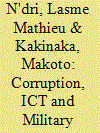

|
|
|
|
|
| Summary/Abstract |
It has been argued that large military spending is often a crucial constraint in Sub-Saharan Africa (SSA) countries, and high corruption has enabled these countries to keep such large military spending. One possible remedy is to promote information and communication technology (ICT), which may cause the anti-corruption policies to become more effective in increasing transparency for the public and reducing unnecessary and abusive military spending. This study discusses the nexus among corruption, military spending, and ICT with a panel data of 48 SSA countries from 2003 to 2015. Our analysis reveals that when ICT prevails, military spending is negatively associated with the control of corruption, so that anti-corruption policies with the usage of ICT could reduce the extravagant budget allocation to military spending. Policymakers should associate sound ICT policy with traditional anti-corruption factors to bring more transparency and less corrupt behaviors in the military department. The reduction in the misuse of military allocation enables the country to increase nonmilitary public spending to face sustainable development challenges for the sake of the population.
|
|
|
|
|
|
|
|
|
|
|
|
|
|
|
|
| 10 |
ID:
119248
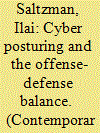

|
|
|
|
|
| Publication |
2013.
|
| Summary/Abstract |
For some realists, cyber warfare is 'old wine in new bottles', with marginal added value. This misses the larger possibilities for political/military chain reactions that cyber warfare may prompt, possibly leading to armed conflict. This article utilizes Offense-Defense theory to appraise the influence of cyber warfare on international security and the prospects for conflict. Offense-Defense theory, as applied here, better explains the relationship between technological innovation and international politics, and leads to different conclusions from other realist approaches. Redefining the Offense-Defense balance to accommodate cyberspace leads to an emphasis on the offensive advantages of cyber capabilities. The offensive and defensive cyber postures of China, Russia, the United States, and NATO are examined here to empirically assess the role of cyber warfare in security policy. Evidence shows that innovations in Information and Communication Technology (ICT) allow states to take greater risks and adopt more vigilant or offensive positions toward adversaries. Cyber capabilities do not cause armed conflict, but make decisions to escalate easier and cheaper. A strategic enabler that provides attackers greater freedom of action, cyber warfare is becoming a necessary condition for the conduct of war, even if it is not a sufficient one.
|
|
|
|
|
|
|
|
|
|
|
|
|
|
|
|
| 11 |
ID:
141377
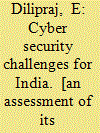

|
|
|
| 12 |
ID:
109027
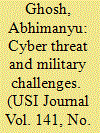

|
|
|
| 13 |
ID:
107292
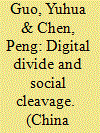

|
|
|
|
|
| Publication |
2011.
|
| Summary/Abstract |
During its structural transformation, rural China witnessed the emergence of four types of village: traditional, industrialized, commercial and villages in cities. Information Communication Technologies (ICTs), including fixed phones, cell phones, television sets and the internet (with personal computers), are now commonly used in Chinese villages but in ways that differentiate villagers according to variables such as occupation, villager membership and social status. The adoption of ICTs by peasants not only represents but also accelerates growing peasant differentiation; in other words, the function of ICTs could not penetrate the barrier of social structure. Meanwhile, structural transformation in China has been an activator to shaping peasants' diversified ideas about information, and the demand for and usage of ICTs. An analysis of peasants' ICT adoption thus enables us to identify the basic trends and characteristics of social transformation in contemporary China.
|
|
|
|
|
|
|
|
|
|
|
|
|
|
|
|
| 14 |
ID:
167572
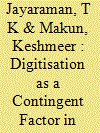

|
|
|
|
|
| Summary/Abstract |
Financial sector development (FSD) has been recognised as a supportive factor, acting as a shift variable in the growth function, besides the fundamental variables of capital stock and labour. Since the beginning of the new millennium, rapid strides in the spread of information and communication technology (ICT) have enabled the hitherto reluctant, urban-based banking institutions to reach the rural masses for mobilising savings. Digitisation through various innovations has made it possible that ‘brick and mortar less’ bank branches now increasingly provide financial services to rural India. This study examines the role of digitisation as a contingent factor in India’s FSD and growth nexus during the last 13 years (2003–2015). The findings of the empirical study through employment of ARDL methodology and application of bounds testing procedure by utilising 52 quarterly observations of the data series of relevant variables reveal that digitisation has indeed emerged a significant factor in the FSD and growth nexus, by playing a complementary role to FSD. There are two policy implications: (a) as ICT has emerged a major tool, it has to be supported at all levels, and (b) the financial inclusion process should be carried forward as it has all the potential to speed up economic growth and development.
|
|
|
|
|
|
|
|
|
|
|
|
|
|
|
|
| 15 |
ID:
116149
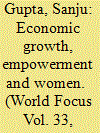

|
|
|
| 16 |
ID:
138834
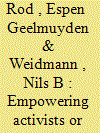

|
|
|
|
|
| Summary/Abstract |
The reported role of social media in recent popular uprisings against Arab autocrats has fueled the notion of ‘liberation technology’, namely that information and communication technology (ICT) facilitates organization of antigovernment movements in autocracies. Less optimistic observers, on the other hand, contend that ICT is a tool of repression in the hands of autocrats, imposing further restrictions on political and social liberties. We investigate whether the liberation- or the repression-technology perspective can better explain empirically observed patterns. To this end, we analyze two outcomes. First, we look at which autocracies are more likely to adopt and expand the Internet. In line with the repression technology expectation, we find that regimes aiming to prevent any independent public sphere are more likely to introduce the Internet. Second, we study the effects of the Internet on changes towards democracy. This analysis reveals no effect of the Internet on political institutions. These findings provide moderate support for the ‘repression technology’ perspective, and suggest that the Internet has not – at least in its first two decades of existence – contributed to a global shift towards democracy.
|
|
|
|
|
|
|
|
|
|
|
|
|
|
|
|
| 17 |
ID:
136709
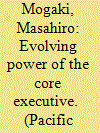

|
|
|
|
|
| Summary/Abstract |
This article addresses the transformation of the state by exploring the case of Japan’s ICT regulation between the 1980s and 2000s prompted by the challenge to the state after the 1980s. It sets out to challenge the dominant pluralist and rational choice literature in Japanese politics that takes an elitist perspective with the concept of the core executive, referring to the body of statist literature, that employes data drawn from the interview of elites. What emerges from this study is a variation on state transformation with a fluid change of power within the core executive in ICT regulation. This can be understood as a dynamic reconstitution process of the Japanese state in response to the challenges both sector-specific and beyond. Mobilised by the change of power, the reconstitution of the Japanese state has transformed the developmentally-oriented characteristic of the Japanese state led by civil servants. Elsewhere, by focusing on the state at a macro level and power relations within the core executive, this article reveals the dominance of the core executive in ICT regulation. It concludes that the Japanese state has retained dominance over society through its reconstitution mobilised by the core executive within which the fluid change of power has occurred between actors.
|
|
|
|
|
|
|
|
|
|
|
|
|
|
|
|
| 18 |
ID:
099035
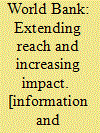

|
|
|
|
|
| Publication |
Washington, DC, World Bank, 2009.
|
| Description |
xix, 316p.
|
| Standard Number |
9780821376058
|
|
|
|
|
|
|
|
|
|
|
|
Copies: C:1/I:0,R:0,Q:0
Circulation
| Accession# | Call# | Current Location | Status | Policy | Location |
| 055295 | 330.9/WOR 055295 | Main | On Shelf | General | |
|
|
|
|
| 19 |
ID:
052505
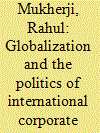

|
|
|
|
|
| Publication |
April 2004.
|
| Summary/Abstract |
Globalization spurred by information and communications technology could erode the ability of states to tax corporations. Digitization makes it easy to penetrate foreign markets without the need for physical presence in the buyer's country. This phenomenon has generated debates on the salience of source- versus residence-based taxation, and the definition of permanent establishment. There is no multilateral organization governing international corporate taxation. The article notes both the inadequacy of unilateral approaches and the need for a global approach to setting and monitoring standards. Consistent with the interests of producer developing countries like India, it commends the vitality of source-based principles and the traditional conception of permanent establishment. India's interests are similar to those of many capital-scarce producer countries exporting their services over the Internet. Moreover, they are not antithetical to the interests of capital-abundant countries. The issue area is in dire need of global governance.
|
|
|
|
|
|
|
|
|
|
|
|
|
|
|
|
| 20 |
ID:
099896
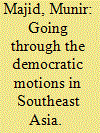

|
|
|
|
|
| Publication |
2010.
|
| Summary/Abstract |
In Southeast Asia there is rising expression of the right to be heard to address grievance or to change policy of government in a desired direction. Although this might have been ignored in the past, by repressive means if deemed necessary, it has become increasingly difficult to push back or aside the wave of such views that today find convergence in a marketplace that engages a global constituency of shared ideas facilitated by civil society organizations and, most importantly, by information and communication technology (ICT). There is a distinction that needs to be made between fulfilment of the principles and practices of liberal democracy on the one hand, and activism in the 'democratic process' on the other, the latter comprising at the one end participation in a large marketplace of expression of views and at the other an experience of concentrated new forms of securing support in electoral contest. It must be borne in mind the principles and institutions of liberal democracy could be absent or limited in the political system, and yet there may be animated activity in the digital sphere of a truncated democracy. Such intense activity in the new media could still come to be dominated by the ruling rich and powerful who already control the conventional media.
|
|
|
|
|
|
|
|
|
|
|
|
|
|
|
|
|
|
|
|
|